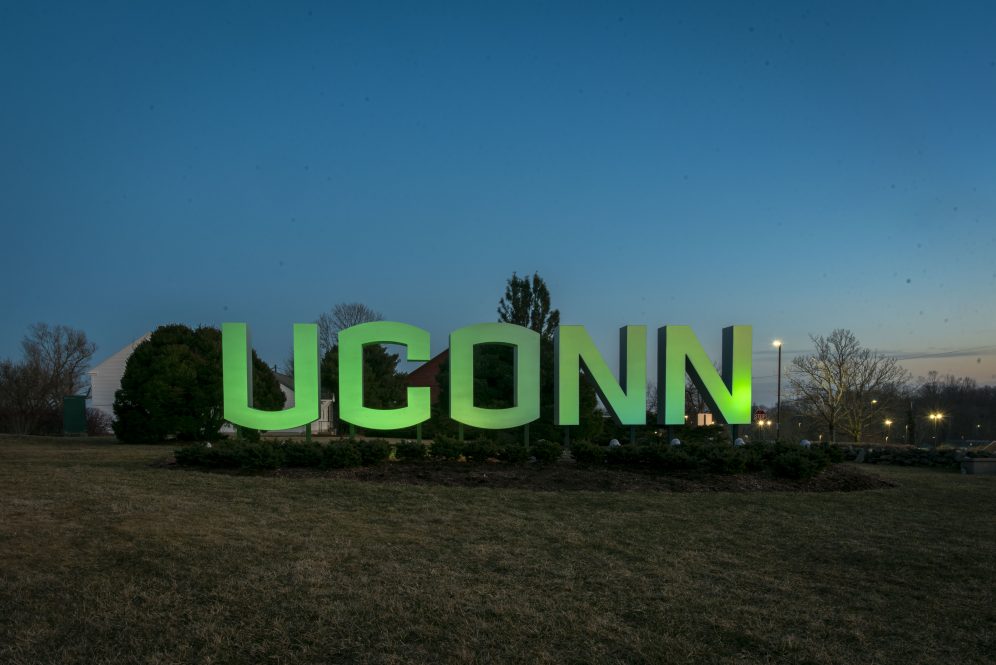UConn was recognized in the latest Association for the Advancement of Sustainability in Higher Education (AASHE) Sustainable Campus Index (SCI) as a Top Performer. Areas where UConn excelled included coordination and planning, as well as campus engagement.
The SCI ratings rely on the Sustainability Tracking, Assessment & Rating System (STARS), which is a self-reporting framework for higher education institutions to track their sustainability efforts. UConn has consistently ranked high in the SCI since the University started participating in the program in 2013. STARS looks at sustainability efforts taken by colleges and universities in the areas of academics, engagement, operations, planning and administration, and innovation and leadership.
Director of the Office of Sustainability (OS), Patrick McKee says these rankings are important for sharing more widely UConn’s performance as a sustainable university.
“I think the visibility that we receive through these rankings is significant because they feed into a number of other publications like the Princeton Review Guide to Green Schools, which students consider when making their decisions on where to attend college,” says McKee.
Achieving this level of success is a team effort, and McKee says students are key. McKee prioritizes student professional development and experiential learning and since he joined the OS in 2018, student opportunities have grown substantially. From just a handful of undergraduate students, the OS team has expanded to over 40 undergraduate interns and graduate assistants across four different internship programs with more eager applicants every year for the growing roster of programs, projects, and initiatives.
McKee says there are many ways students can get involved, and one example is by serving as Outreach Interns.
“They serve as sustainability ambassadors, peer educators, and extra hands whenever we need help for sustainability outreach events,” says McKee. “There is one ambassador in each residential hall area, and we have one graduate student who oversees the program.”
OS intern Claire Lawrence ’26 (CLAS) took the lead in completing UConn’s submission for this year’s SCI, demonstrating the importance of student involvement and teamwork.
“STARS has been my main goal. We were moving from the STARS 2.2 to the new STARS 3.0 and the process helped me be more familiar with UConn, because every part of UConn goes into the rating. Through the process, I got a general impression of our rating and what that means, and how we can improve from there,” says Lawrence. “When it comes to filling out the survey and getting all the data points, luckily, it’s a whole office initiative, and we can get support from all of our interns, and that’s great.”
Sustainability interns also create platforms and resources to help connect and educate the campus community. For example, student interns have created resources like the Environmental Justice Toolkit to educate others about the intersections of environmental and social justice, and the ECollaboration Sustainability Network to connect sustainability-minded students, faculty, and staff.
“We are also adding a zero-waste graduate student coordinator to support Zero Waste initiatives, including oversight of the Thrift Den that was added to the OS scope of responsibility last year. Graduate students can serve as points of contact for driving some of these initiatives,” says McKee.
The demand for these positions is high, says McKee. This year the OS had over 90 applicants to fill seven Sustainability Intern positions. They had another 85 applicants for the Outreach Intern positions and another 85 applicants for the UConn@COP program. The growing demand speaks to the increasing need for these kinds of efforts in higher education. Coupled with the academic programs and the environmental literacy general education requirement, McKee says there are many aspects to attract students who are passionate about the environment to UConn.
“UConn students get a taste for what it means to be a responsible environmental steward, and through the Office of Sustainability, we engage with them in different types of events, like the Haunted HEEP where we had 1,200 students attend last year. We keep trying to be creative in our efforts to engage students of all backgrounds and academic disciplines,” says McKee.
The SCI achievement for excellence in coordination and planning speaks to the importance of UConn’s Sustainable Policy, Energy, and Environment Advisory Committee (SPEEAC), says McKee, which will continue to be integral for establishing and driving ambitious sustainability goals that the university can work toward.
“Collectively, we can try to move the needle. The council is comprised of over 60 university leaders and students from Storrs, regional campuses, and UConn Health, which convenes twice a year,” says McKee. “We meet to come up with ideas, develop strategies, and working groups for recommendations to present to the president’s office and then work toward achieving those goals.”
McKee says they are also eager to expand the UConn@COP program by sending students and faculty to different United Nations Conferences of Parties, such as the United Nations Biodiversity Conference.
The ranking as an SCI top performer and growing student interest in environmental stewardship are a testament to the efforts of the Office of Sustainability to build a greener UConn.
“The UConn community should be proud of its collective efforts over the years to reduce its environmental impacts and to prepare students to be change agents in their careers. That said, the work is truly just beginning,” says McKee. “We still have an immense carbon footprint to mitigate and will need all-hands-on-deck to achieve carbon neutrality and other future goals. We don’t want to just be a global leader in higher education sustainability; we want to be THE leader. I’m extremely excited about the opportunities that lie ahead, and I know that our students share in that excitement.”



